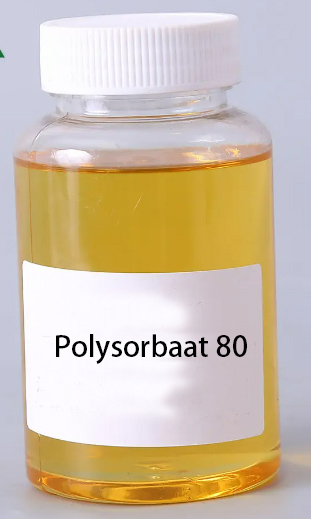Polysorbate-80
What Is It?
Polysorbate-80 stands out as a remarkable alternative surfactant and emulsifier, primarily renowned for its remarkable ability to facilitate the dissolution of other ingredients. This attribute ensures that cosmetic formulations achieve the desired consistency and uniformity, creating products that are both visually appealing and effective.
Polysorbate-80 extends its utility into the realm of pharmaceuticals, where its significance cannot be overstated. This compound finds application as a solubilizing agent, playing a pivotal role in injectable medications, including specific vaccines. In the pharmaceutical context, Polysorbate-80’s efficacy in solubilizing proteins and stabilizing aqueous formulations is truly remarkable. In fact, it’s a key component in IV formulations of the antiarrhythmic drug amiodarone, highlighting its indispensable role in ensuring the stability and effectiveness of medications.
Polysorbate-80’s influence extends into the culinary world. Its role as a food emulsifier and essential oil solubilizer makes it an indispensable component in the production of various foods with polysorbate 80. Most notably, it finds application in the production of ice cream and other dessert items, where its emulsifying properties help maintain the desired texture and consistency, enhancing the overall eating experience.
Chemical and Physical Properties
Polysorbate-80, also recognized under the alternate name of Polyoxyethylene (80) sorbitan monooleate, boasts a complex array of chemical and physical properties that contribute to its multifunctional nature. Its chemical formula, C64H124O26, underscores its intricate molecular structure, which lends itself to a molar mass of 1310 g/mol. In its natural state, Polysorbate-80 presents as an amber-colored liquid, offering a visual cue to its distinct identity.
In terms of its physical attributes, Polysorbate-80 possesses a density of 1.102 g/mL, rendering it an oily liquid that flows with a characteristic viscosity of 300–500 centistokes (@25°C). This viscosity measurement provides insight into the substance’s flow behavior and is a key determinant of its utility in various applications. The compound exhibits a boiling point that surpasses 100°C, denoting its stability under elevated temperatures.
A significant facet of Polysorbate-80’s versatility is its solubility profile. It exhibits remarkable solubility in water, with a concentration of 100 mL per liter, highlighting its hydrophilic nature. Beyond its affinity for water, this compound showcases solubility in various alternative solvents, including ethanol, cottonseed oil, corn oil, ethyl acetate, methanol, and toluene. This solubility range extends its applications across different formulations and industries.
Identified by the CAS Number 9005-65-6, Polysorbate-80 finds classification in the realm of E numbers, particularly E433, where it functions as a thickening agent among other roles. This classification system provides a standardized way to identify and understand the roles of different food additives.
Is Polysorbate 80 natural?
The answer is no. Polysorbate 80 is not a natural compound. Instead, it falls under the category of synthetic ingredients. This synthetic nature arises from a carefully orchestrated series of chemical processes that give rise to its distinct molecular structure.
The synthesis of what is Polysorbate 80 involves several intricate steps, each contributing to its creation. The process commences with the dehydration of sorbitol, a sugar alcohol commonly found in fruits. This initial step sets the stage for the subsequent transformations. Esterification with oleic acid follows suit, involving the bonding of sorbitol with oleic acid, a fatty acid derived from natural sources like vegetable oils. This bonding process imparts specific attributes to the resulting compound, contributing to its emulsifying and solubilizing capabilities.
The final step in the synthesis journey involves etherification with ethylene oxide. This step is pivotal in molding the compound’s hydrophilic nature and further enhancing its surfactant properties. The union of ethylene oxide with the previously esterified molecule brings about the compound we know if we ask what is Polysorbate 80.
Is Polysorbate 80 vegan?
Yes! Polysorbate 80 is vegan. In addition to its vegan status, Polysorbate 80 also bears alternative reassuring labels, making it a suitable option for individuals with specific dietary needs. Being lactose-free ensures its compatibility with lactose-intolerant individuals who must meticulously avoid any trace of dairy-derived ingredients. Moreover, its gluten-free attribute addresses the dietary needs of those with gluten sensitivities or celiac disease, providing a safe option for consumption.
What is Polysorbate 80’s compatibility with dietary requirements extends to being glutamate-free. This attribute is significant, particularly for individuals who are sensitive to or actively avoid glutamate-containing compounds due to health considerations.
Polysorbate 80 in food safety holds the distinction of being BSE (Bovine Spongiform Encephalopathy) free. This factor is pivotal as BSE is a prion disease that affects cattle and can potentially pose health risks when consumed by humans. The absence of BSE in Polysorbate 80 reinforces its safety and suitability for various applications, particularly polysorbate 80 in food industry.
What Products Is It Used In?
One of the notable domains where Polysorbate-80 makes its presence felt is in the realm of food products. Polysorbate 80 substitutes as an additive in enhancing the texture and consistency of frozen desserts, ensuring a smooth and creamy mouthfeel that delights the taste buds. Additionally, it’s a key ingredient in shortenings, contributing to their optimal texture for baking purposes. Baking mixes and icings also benefit from Polysorbate-80’s emulsifying prowess, guaranteeing uniform and pleasing results. Even canned vegetables make use of this versatile compound to maintain their visual appeal and quality.
Transitioning to the realm of personal care products, Polysorbate-80 continues to prove its worth. It features prominently in various skincare products, including those designed for after-shave care, delivering its emulsifying and stabilizing abilities to create formulations that soothe and nourish the skin. Similarly, after-sun products harness its attributes to provide relief and hydration post-sun exposure. Its anti-aging properties find application in products targeted at diminishing signs of aging, where its role in ensuring uniform distribution of active ingredients is crucial.
In comparison, Polysorbate 20 vs 80 in skincare expands to specialized areas such as around-eye creams, ensuring that delicate skin around the eyes receives gentle yet effective care. In the realm of baby care, Polysorbate-80 is found in baby oil, baby shampoo, and even baby sunscreen, demonstrating its compatibility with sensitive skin and its role in enhancing product effectiveness.
Expanding beyond skincare, Polysorbate-80 is a common ingredient in personal hygiene products like bar soap. Polysorbate 80 in bath bombs are also found. In the pharmaceutical sphere, it finds application in creams, ointments, lotions, and medication tablets, aiding in their formulation and efficacy. Additionally, it’s utilized in supportive care during chemotherapy, addressing specific medical needs.
The Effects of Polysorbate 80
In-depth research studies have cast light on the potential repercussions of Polysorbate 20 vs 80 on the proper functioning of the gastrointestinal system. These studies have yielded both Polysorbate 20 vs 80 has consistent findings that underscore its potential to disrupt the integrity of the intestinal membrane. Central to this concern is the compound’s ability to heighten intestinal membrane permeability, a pivotal factor in maintaining the body’s gut barrier function. The intricate network of cells that comprise the intestinal membrane forms a barrier that selectively permits the passage of nutrients while preventing harmful substances from entering the bloodstream.
One key mechanism through which Polysorbate 80 exerts its effects involves the release of enzymes that can inflict damage upon the cellular structure of the intestinal membrane. This disruption can lead to increased permeability, allowing substances that would typically be excluded to pass through. This compromised gut barrier can have far-reaching consequences, potentially leading to heightened immune responses, inflammation, and increased susceptibility to certain health issues.
Important: Not All Polysorbate 80 Is Created Equal
It is imperative to recognize that not all forms of Polysorbate 80 are created equal, bearing consequences that extend beyond its intended applications. While Polysorbate 80 serves as a versatile ingredient in various industries, particularly cosmetics, there’s an important caveat to consider regarding its composition. The cosmetic grade of Polysorbate 80 substitutes in beauty products like polysorbate 80 in bath bombs might potentially harbor impurities that raise concerns.
Of particular worry is the potential presence of impurities such as ethylene oxide, 1,4-dioxane, and mono- and diethylene glycol in certain cosmetic grade Polysorbate 80 formulations. These impurities, which are not intrinsic to the compound’s composition, have drawn attention due to their carcinogenic properties. What’s alarming is that these same contaminants have also been detected foods with polysorbate 80, posing potential risks across multiple domains.
The distinction between different grades of Polysorbate 80 becomes more pronounced when considering these impurities. Cosmetic grade Polysorbate 80 is more likely to contain these worrisome contaminants. However, some manufacturers in the realm of natural cosmetics demonstrate a heightened level of vigilance regarding the quality of the ingredients they utilize. They opt for polysorbate 80 in food-grade, which adheres to stricter standards, ensuring a reduced likelihood of impurities and contaminants.
Should We Avoid Polysorbate 80?
It is crucial to recognize that Polysorbate 80, when used within proper and recommended dosages, poses minimal risk and is polysorbate 80 safe for consumption. When adhering to prescribed guidelines, the compound can serve its intended purposes without raising undue health concerns. However, the situation changes when usage exceeds recommended levels. Polysorbate 80’s overuse has been looked at, especially in terms of how it affects some types of germs.
In the lab, study has shown that too much Polysorbate 80 can affect the growth of certain types of bacteria in both planktonic and biofilm environments. This means that the effect of the chemical goes beyond its main use, especially when it is used in creams and beauty items. These results show that the compound can change the balance of germs on the surface of the skin when it is used in skin care products. In the same way, Polysorbate 80 could affect the bacteria of the digestive system if it was added to foods or medicine. This shows that it can have effects in many different situations.
In the end, the answer to whether you should avoid Polysorbate 80 depends on how you use it, how much you use, and where you use it. Moderate use of Polysorbate 80 follows suggested rules seems to be safe. This is in line with the idea that too much of any drug can have bad effects. It is important to find a balance between the benefits of Polysorbate 80 and how it might affect the balance of germs in the skin and the gut. In the end, people will be able to use Polysorbate 80 in a way that is best for their general health if they make choices that are well-informed and take dosage and situation into account.

